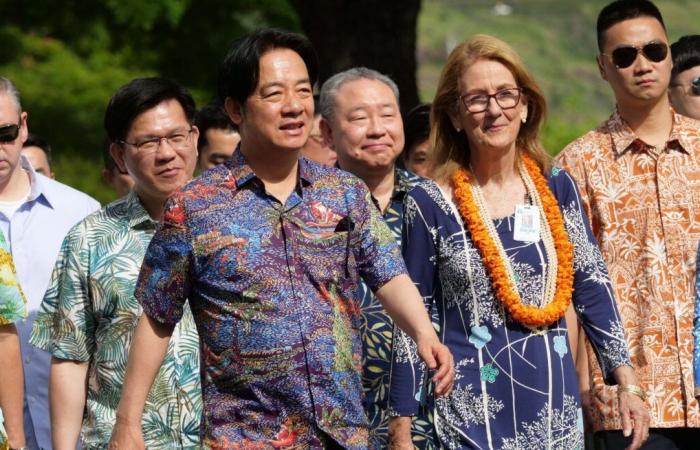Taiwanese President Lai Ching-te was welcomed on Saturday with a red carpet and flower necklaces in the American archipelago of Hawaii, the first stop on a tour of several Pacific territories which sparked protests from Beijing.
Greeted by “alohas,” the leader appeared relaxed, in a Hawaiian shirt, to visit the Bishop Museum of Natural and Cultural History and the Hawaii Emergency Services Management Agency, receiving a number of gifts.
When he got off the plane early Saturday morning, a red carpet awaited him, for his first trip abroad since taking office in May.
Such treatment is a first for a Taiwanese leader, his office said in a statement.
He was welcomed by Hawaii Governor Josh Green and Ingrid Larson, the Washington director of the American Institute in Taiwan (AIT), the de facto American embassy on the island.
“Strongly condemns”
“China strongly condemns the United States' organization of the Lai Ching-te 'transit' and has made solemn protests to the United States,” a Chinese Foreign Ministry spokesperson said in a statement. .
“China will closely monitor the development of the situation and take resolute and effective measures to safeguard its national sovereignty and territorial integrity,” he stressed.
Opposed to any initiative giving the Taiwanese authorities international legitimacy, China is firmly against any official contact between Taiwan and other countries.
In Hawaii, Lai Ching-te was welcomed by Governor Josh Green as well as Ingrid Larson, the director in Washington of the American representation in Taipei (American Institute in Taiwan).
Beijing regularly criticizes Washington for not respecting the promise not to have official relations with Taipei.
The Taiwanese president is due to visit the Marshall Islands, Tuvalu and Palau, the only nations in the region among the 12 remaining allies to recognize Taiwan.
In the evening, Mr. Lai received a standing ovation when he arrived on a red carpet at a dinner with U.S. government officials and overseas Taiwanese.
Mr. Lai said he was “grateful” to the United States for its assistance in ensuring the success of his tour. The partnership between Washington and Taipei is “rock solid,” declared the president of the American Institute in Taiwan, Laura Rosenberger, at this dinner.
Sale of weapons
China also expressed on Sunday its “firm opposition” and “deplored” the approval by the United States of a new project to sell arms to Taiwan, to the tune of 385 million dollars (364 million euros). ).
“We urge the United States to immediately stop arming Taiwan and stop encouraging and condoning forces that seek Taiwan's independence and want to strengthen its military to achieve this,” China's Ministry of Defense said. Foreign Affairs in a separate statement.
“China will take strong and resolute countermeasures to firmly defend its national sovereignty, security and territorial integrity,” he said.
Although Washington does not have formal diplomatic relations with Taipei, it remains the island's main financial backer and its largest arms supplier.
Relations between Beijing and Taipei have been terrible since 2016 and the arrival as Taiwanese president of Tsai Ing-wen, then Lai Ching-te in 2024.
China regularly accuses them of wanting to deepen the cultural separation between the island and the continent. In response, Beijing notably strengthened its military activity around Taiwan.






